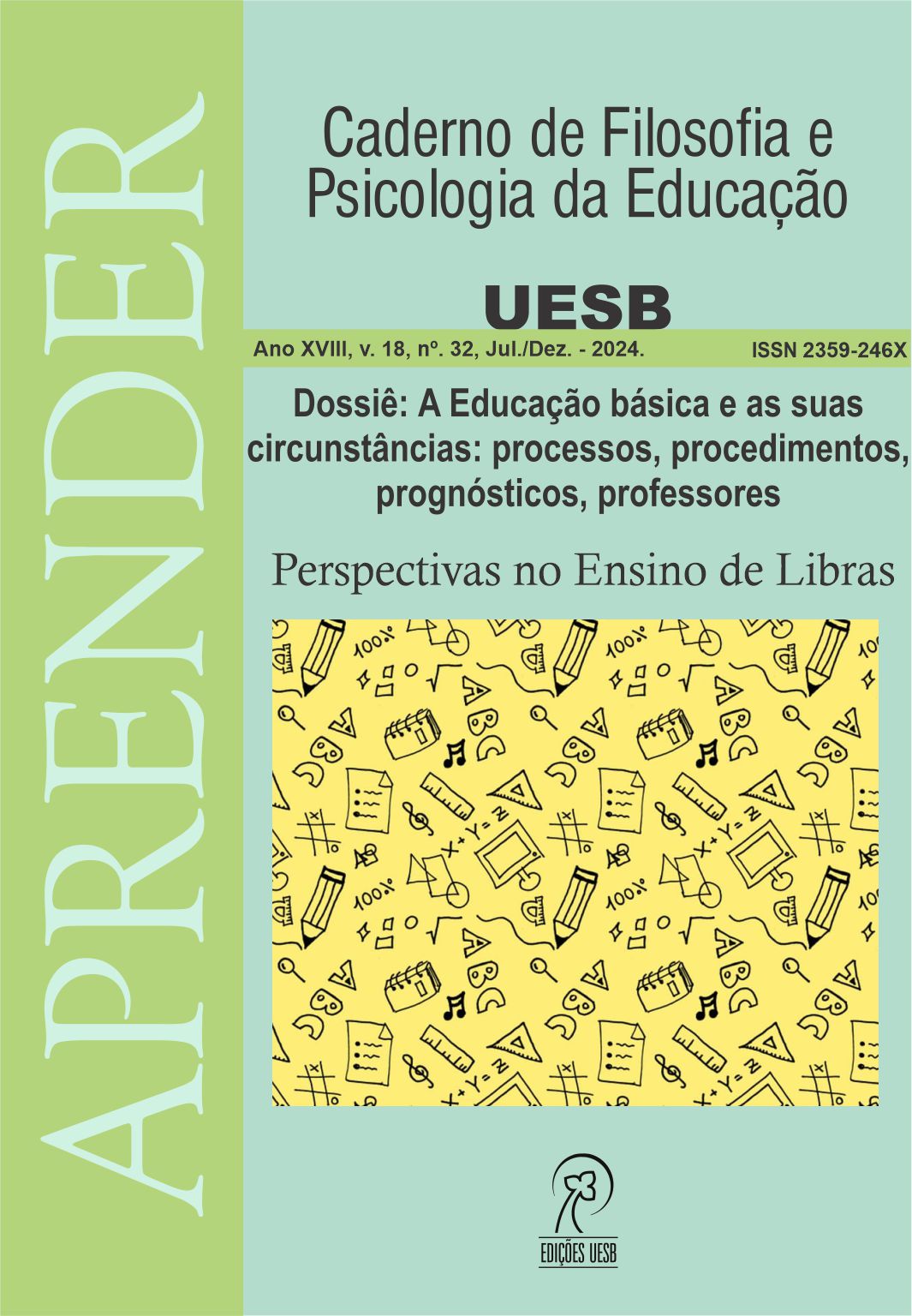Technology in the initial training of Pedagogy students
DOI:
https://doi.org/10.22481/aprender.i32.14886Keywords:
Education, Initial teacher training, TecnologiasAbstract
This article originated from a master's research project that aims to analyze the initial training of future pedagogues in relation to technology, with the objective of understanding how technology is contemplated in the academic environment and how it is offered or not in the curriculum of the Pedagogy course at a private university in the city of Porto Alegre. The exploratory work consists of identifying the role of technology in the initial training of Pedagogy students, in order to understand the students' initial perception of the subject and to deepen the concept of technology. The arguments defended consist of placing the focus on technology at the service of learning and linked to the historical context, exploring the so-called "technological era", which reflects the reality of society in different times and spaces, and does not limit the discussion to current times and technical perceptions. Therefore, it was realized that technological advances have always been part of humanity and understanding how they interfere in academic training is an important part of this study. Thus, the data collected by qualitative research were analyzed using bibliographic and documentary methodology. As a conclusion of this study, it was noted that the institution analyzed contemplates in its new curriculum the application aimed at deepening the potential of technology in academic training. Therefore, it has contributed to training new Education professionals, promoting a more assertive and efficient use of the technological resources available and applicable in their professional performance.
Downloads
References
BACICH, L. Ensino Híbrido: personalização e tecnologia na Educação. Tecnologias, Sociedade e Conhecimento, Campinas, v. 3, n. 1, p. 100-103, dez. 2015. Disponível em: http://www.nied.unicamp.br/ojs/.
BACICH, L.; MORAN, J. (orgs). Metodologias ativas para uma educação inovadora: uma abordagem teórico-prática. Porto Alegre: Penso, 2018.
BARDIN, L. Análise de Conteúdo. Lisboa: Edições 70, 1977.
BEHAR, P. A.; SILVA, K. K. A. da. Mapeamento de competências: um foco no aluno da educação a distância. Revista Novas Tecnologias na Educação, Porto Alegre, v. 10, n. 3, p. 1-11, dez. 2012. Disponível em: https://seer.ufrgs.br/index.php/renote/article/view/36395. Acesso em: 2 fev. 2024.
BORGES, M. C.; AQUINO, O. F.; PUENTES, R. V. Formação de professores no Brasil: história, políticas e perspectivas. Revista HISTEDBR On-line, Campinas, n. 42, p. 94-112, jun. 2011. Disponível em: https://periodicos.sbu.unicamp.br/ojs/index.php/histedbr/article/view/8639868/7431. Acesso em: 4 ago. 2023.
BRASIL. Ministério da Educação. Base Nacional Comum Curricular. Brasília, DF: MEC, 2018. Disponível em: http://basenacionalcomum.mec.gov.br/. Acesso em: 4 ago. 2023.
BRASIL. Ministério da Educação. Conselho Nacional de Educação. Parecer CNE/CP nº 9/2001, aprovado em 8 de maio de 2001. Diretrizes Curriculares para a Formação Inicial de Professores da Educação Básica em Cursos de Nível Superior. Brasília, DF: MEC, 2001. Disponível em: https://normativasconselhos.mec.gov.br/normativa/view/CNE_009.pdf?query=FORMA%C3%87%C3%83O. Acesso em:5 fev. 2024.
BRASIL. Ministério da Educação. Lei nº 9.394, de 20 de dezembro de 1996. Estabelece as diretrizes e bases da educação nacional. Brasília, DF: MEC, 1996. Disponível em: https://www.planalto.gov.br/ccivil_03/leis/l9394.htm. Acesso em: 4 ago. 2023.
FIGUEIREDO, A. D. Por uma escola com futuro: para além do digital. Revista Nova Ágora, São Paulo, n. 5, p. 19-21, set. 2016. Disponível em: https://www.researchgate.net/publication/309124131_Por_uma_escola_com_futuro_para_alem_do_digital. Acesso em: 2 fev. 2024.
GÓMEZ, A. I. P. Educação na Era Digital: a escola educativa. Tradução Marisa Guedes. Porto Alegre: Penso, 2015.
INSTITUTO NACIONAL DE ESTUDOS E PESQUISAS EDUCACIONAIS ANÍSIO TEIXEIRA. EaD registra 3 milhões de ingressantes em 202. Gov.br, Brasília, DF, 17 out. 2023. Disponível em: https://www.gov.br/inep/pt-br/assuntos/noticias/censo-da-educacao-superior/ead-registra-3-milhoes-de-ingressantes-em-2022. Acesso em: 10 ago. 2023.
MEDEIROS, E. A. de; DIAS, A. M. I.; OLINDA, E. M. B. de. Formação inicial de professores da Educação Básica no Brasil: uma leitura histórica e político-legal. Educação em Perspectiva, Viçosa, v. 11, p. 1-19, mar. 2020. Disponível em: https://periodicos.ufv.br/educacaoemperspectiva/article/view/8893. Acesso em: 2 fev. 2024.
NAÇÕES UNIDAS BRASIL. UNESCO: dois terços do ano acadêmico foram perdidos com o fechamento das escolas devido à COVID-19. Nações Unidas Brasil, Brasília, DF, 27 jan. 2021. Disponível em: https://brasil.un.org/pt-br/109412-unesco%C2%A0dois-ter%C3%A7os-do-ano-acad%C3%AAmico-foram-perdidos-com-o-fechamento-das-escolas-devido-%C3%A0#:~:text=O%20mapa%20mostra%20que%2C%20em,o%20fechamento%20localizado%20de%20escolas. Acesso em: 10 ago. 2023.
NÚCLEO DE INFORMAÇÃO E COORDENAÇÃO DO PONTO BRASIL (ed.). Pesquisa sobre o uso das tecnologias de informação e comunicação nas escolas brasileiras: TIC Educação 2022. São Paulo: Comitê Gestor da Internet no Brasil, 2023. Disponível em: https://cetic.br/pt/pesquisa/educacao/publicacoes/. Acesso em: 10 ago. 2023.
PINTO, Á. V. Conceito de Tecnologia. Rio de Janeiro: Contraponto, 2005. v. 1.
SAVIANI, D. Formação de professores: aspectos históricos e teóricos do problema no contexto brasileiro. Revista Brasileira de Educação, Rio de Janeiro, v. 14, n. 40, p.143-155, jan./abr. 2009. Disponível em: https://www.scielo.br/j/rbedu/a/45rkkPghMMjMv3DBX3mTBHm/?format=pdf&lang=pt. Acesso em: 10 ago. 2023.
SAVIANI, D. O sentido da Pedagogia e o papel do Pedagogo. Revista ANDE, São Paulo, v. 5, n. 9, p. 27-28, dez. 1985. Disponível em: https://drive.google.com/file/d/1ccE3R6RKBz4LBffyGqCCGr02bkvYrQbc/view. Acesso em: 10 ago. 2023.
SOFFNER, R. Tecnologia e Educação: um diálogo Freire – Papert. Tópicos Educacionais, Recife, v. 19, n. 1, p. 147-162, jan./jun. 2013. Disponível em: https://periodicos.ufpe.br/revistas/topicoseducacionais/article/viewFile/22353/18549. Acesso em: 10 ago. 2023.
TARDIF, M. Saberes docentes e formação profissional. Petrópolis: Vozes, 2002.
Downloads
Published
How to Cite
Issue
Section
License
Copyright (c) 2024 APRENDER - Caderno de Filosofia e Psicologia da Educação

This work is licensed under a Creative Commons Attribution-ShareAlike 4.0 International License.






